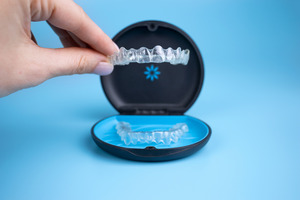
Bruxism is an all-too-common condition that can cause you to clench and grind your teeth without consciously meaning to. If you already know that you have bruxism, then you may be concerned that the condition could stop you from using Invisalign to straighten your smile. But is this really something you need to be concerned about? Here’s what you should know about bruxism and Invisalign treatment.
How Does Invisalign Work?
Invisalign uses a series of clear plastic aligners that put small amounts of pressure on the teeth in order to guide them toward a better alignment. In order to ensure that the teeth move as intended, the aligners need to remain in your mouth for at least 20 to 22 hours every day, and they are typically switched out every two weeks or so.
Will Bruxism Disqualify You from Getting Invisalign?
Bruxism is known to put excessive amounts of pressure on the teeth, wearing them down faster than normal and potentially causing serious damage in the long run. It’s not hard to assume that the condition can do the same thing to clear aligners and thus make Invisalign unfeasible.
Fortunately, this is not necessarily the case. Invisalign aligners are quite durable, allowing them to withstand the pressures of bruxism. While excessive grinding and clenching can cause them to wear down more quickly, this generally isn’t a major problem since you’ll be switching to new aligners every couple of weeks anyway. And if bruxism does result in an aligner breaking before you’re done with it, you can simply ask your dentist about having a replacement made.
In many cases, Invisalign can actually prove to be beneficial for patients with bruxism. Wearing clear aligners for most of the day means that your upper and lower teeth won’t be making direct contact with each other. As such, your teeth will actually be protected from the grinding and clenching that can damage them.
Will You Be Able to Use Your Nightguard During Invisalign Treatment?
You may already use a nightguard to keep bruxism under control at night. However, you will not be able to use it during your Invisalign treatment due to the fact that the aligners need to remain in your mouth while you’re asleep. Fortunately, this shouldn’t be a major issue due to the protection offered by the clear aligners. That said, once your Invisalign treatment is complete, you will likely need to have a new nightguard made to account for the new positions of your teeth.
In summary, having bruxism does not mean you cannot qualify for an Invisalign treatment. Feel free to speak to your dentist about using clear aligners to overcome crooked teeth and any other orthodontic issues that might be bothering you.
About the Practice
At Marvel Dental, we have multiple dentists who are all dedicated to providing quality, comprehensive care while building positive, trusting relationships with all of our patients. We’re proud to be able to offer Invisalign for patients who would like an alternative to braces for correcting mild to moderate orthodontic issues. If you’re interested in scheduling an appointment at our office in Burleson, visit our website or call (817) 933-3883.


